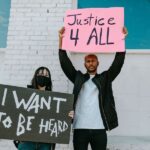
Clare Norins, director of the University of Georgia’s First Amendment Clinic, spoke with Georgia Public Broadcasting’s Orlando Montoya about recent petition-and-referendum initiatives in Georgia, including voters’ rejection of the Camden County spaceport project, which outcome was upheld by the Georgia Supreme Court, and the petition effort to stop the Atlanta Public Safety Training Center (APSTC), which has been the subject of federal litigation.
The First Amendment Clinic filed amicus briefs in support of the petitioners in both the Camden County and APSTC cases.
Voters in McIntosh County, Georgia have also organized a petition drive to try to force a referendum vote to repeal a zoning change ron Sapelo Island’s Hogg Hummock, the last Saltwater/Gullah Geechee community on a Georgia barrier island.
Norins noted that petition-and-referendum initiatives are usually a measure of last resort after voters have tried to affect local government decisions through more traditional means like public comment at open meetings and contacting their elected officials directly.
“It takes a lot of work to collect enough signatures on a petition to meet the legal threshold for requiring a referendum vote,” Norins explained. “[U]nder the state constitution [for county referendums], it can be anywhere from 10% to 25% of the registered electors in the county. And then those signatures have to be certified as, you know, authentic and legitimate. And then at that point, the referendum vote would be mandated. So it’s not something that can be easily or lightly done.”
When asked if, going forward, Georgia is likely to see an increased number of referendum elections that could be expensive for local governments, Norins replied, “I think we need to let it play out a few more years and see how many of these petitions really come to pass. But I — I wouldn’t necessarily say that an increased number of petitions and referendums is a is a bad thing. I understand it may be inconvenient for the city or county government officials who have done something that the people don’t like. . . [B]ut I think in terms of having a participatory democracy, it’s important that we have these checks and balances.”
A transcript of the interview, which aired on October 3, 2023, and was incorporated into GPB’s Georgia Today podcast, is available here (Story 8).

The Issue
Free Speech
The First Amendment protects the right of private individuals to engage in speech and expression without being censored or punished by the government because of their viewpoint. While the government may constitutionally regulate the time, place, and manner of private speech in public forums it must do so in a viewpoint-neutral manner and, depending on…
Explore Issue